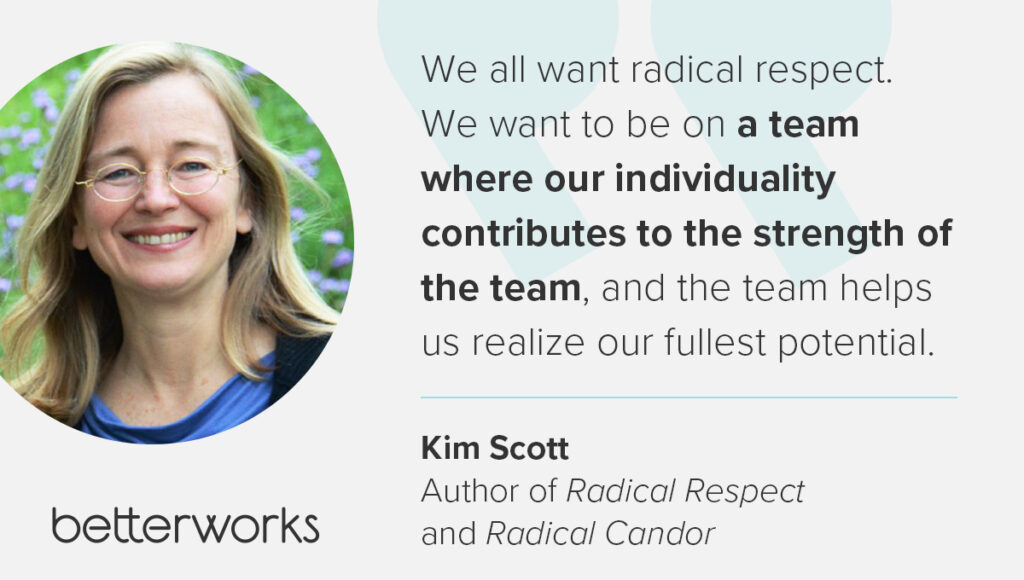For many people today, work is more than just a paycheck. It’s an opportunity to find a place where they can truly belong and flourish.
The key to creating that kind of workplace, according to Kim Scott, is radical respect. “We all want to be on a team where our individuality contributes to the strength of the team, and the team helps us realize our fullest potential,” says Kim, the New York Times bestselling author of “Radical Candor” and “Radical Respect.”

If we all want that kind of experience at work, why is it so rare? What gets in the way? The three big obstacles are bias, prejudice, and bullying, according to Kim, and that’s why she is dedicated to addressing them every chance she gets. “By speaking about these problems in a more straightforward way, we can begin to solve them,” she says.
We spoke with Kim before her People Fundamentals webinar to learn more about the steps HR leaders can take to build a psychologically safe culture.
Be an upstander, not a bystander
Being an upstander rather than a bystander means taking action when you notice disrespect. “Being an upstander means you intervene in some way,” Kim says. To think about how to intervene, she recommends the five D’s outlined by righttobe.org.
- Direct intervention involves offering some feedback to the person whose attitude or behavior was disrespectful. This approach should only be used if you’re confident it won’t further harm the person affected.
- Alternatively, you can delay your response by checking in with the affected person later, which can help to build solidarity with the person harmed and prevent them from feeling gaslit.
- Creating a distraction, such as spilling coffee, can defuse tense situations. Kim recalls a moment when a supervisor began loudly cursing at her in front of her peers. Someone tossed a ball in the supervisor’s direction, providing enough cover for her to regain her composure.
- Delegation involves enlisting someone else in the room who may be better positioned to speak up.
- Lastly, documenting the incident and sharing it with the affected person can help them address the issue later.
Being an upstander isn’t always easy. It can be awkward, and you may worry about making the situation worse. However, it’s crucial for creating a respectful workplace. Remember that the goal is to support the person affected and educate others, not to shame or punish anyone. By taking action, you contribute to a culture where disrespectful behavior isn’t tolerated and everyone feels valued and supported.

Train leaders to disrupt harmful behaviors
To train leaders to disrupt bias, prejudice, and bullying, Kim emphasizes the importance of equipping them with specific strategies and creating a culture of accountability. Establish a shared vocabulary or gesture to use when bias comes up during meetings. This could be as simple as waving a purple flag (as Kim’s team does), throwing up a peace sign, or using an agreed-upon phrase.
The key is to make it easier to point out unconscious bias in the moment. Too often we default to silence because we don’t know what to say.
To address prejudice, leaders need to teach their teams to use “it” statements. An “it” statement shows the line between one person’s freedom to believe whatever they want—but not to impose that belief on others. It can appeal to company policy, the law, or common sense. You can play a crucial role here by making sure company policies are clear. Create space for conversations about where to draw the line between personal beliefs and workplace behavior.
When it comes to bullying, leaders are responsible for enforcing consequences. “Leaders have got to create conversational consequences for bullying, compensation consequences for bullying, and career consequences for bullying,” Kim says. This includes factoring teamwork into performance ratings and making it clear that patterns of bullying will stop promotions or even lead to firing. By consistently enforcing these consequences, leaders can create a culture where bad behavior isn’t tolerated and respect becomes the norm.
Implement systemic checks and balances
For radical respect to succeed, it must be rooted in deeper organizational structures. “If you are a leader and you don’t design your management systems to be fair, if you don’t design checks and balances into every stage of the employee life cycle, if you don’t quantify bias at every stage of the employee life cycle, you’re going to get systemic injustice every single time — no matter how good your intentions are,” Kim says.
Systems like performance management, for example, can reinforce consequences for troubling behaviors. “It’s really important that if someone gets a bad rating on their teamwork, that they get a bad rating overall — no matter how good their performance is,” Kim says. “Because if you don’t, if you allow someone to bully others and get a high rating and get paid a high bonus, then it’s going to escalate.”
By building these checks and balances into organizational structures and processes, you can make real progress toward creating more fair, inclusive, and respectful work environments.
To learn more about driving radical respect in your company culture, register for the webinar.
Build a culture of "radical respect"



